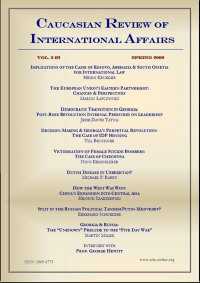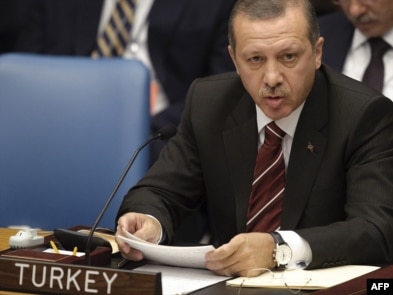To : Members of “Caucasian Review of International Affairs”
on Facebook
From: Nasimi Aghayev 12 October 2009
To : Members of “Caucasian Review of International Affairs” on Facebook
From: Nasimi Aghayev 12 October 2009
 Caucasus Update No. 50, October 12, 2009
Caucasus Update No. 50, October 12, 2009
Caucasian Review of International Affairs
)
As Turkey and Armenia prepare to open their mutual border and begin a thaw in their relationship, there are fears that a recent spat between Tbilisi and Yerevan could heighten regional tensions once again.
In early September, Armenia’s President Serzh Sarkisian set out plans to improve the situation of Georgia’s ethnic Armenians. He called for the preservation of Armenian national monuments in Georgia, registering the Armenian Apostolic Church and – most importantly – recognising Armenian as an official language in Georgia.
The series of measures followed a visit by Georgian President Mikheil Saakashvili to Yerevan in June, when Georgia’s Armenians formally called on President Sarkisian to raise their demands – for greater cultural and political rights – with President Saakashvili (RFE/RL, June 18). Not wishing to antagonise a vital ally when the ‘Turkish thaw’ still seemed distant, President Sarkisian quietly ignored the demands. Indeed, he actually praised the Georgian leader for his efforts at improving the social and economic welfare of Javakheti, a region mostly populated by ethnic Armenians in southern Georgia (RFE/RL, June 25).
The package of measures which President Sarkisian proposed in September therefore came as something of a surprise to Tbilisi. Georgian officials reacted with scorn – State Minister for Reintegration Temur Iakobashvili remarked that he was “very glad that Armenian language is the only state language in Armenia”, but that it would not be adopted in Georgia (Georgia Times, September 3).
Analysts have linked the timing of the move to the Turkish thaw. The imminent opening of the Turkish-Armenian border (if both parliaments ratify the move, which is still not certain) means that Georgia’s position as Armenia’s only easy transport corridor to the West is at risk. With the option of moving goods west through Turkey, rather than north-west to Georgia’s coast and then across the Black Sea, Tbilisi’s vital role as an economic lifeline for Yerevan will be lost.
This increases Armenia’s bargaining position regarding Georgia, and particularly the Armenians of Javakheti. The issue has been a matter of contention for years between the two sides. The Javakheti Armenians complain that their cultural and political rights are being ignored by Tbilisi, and frequently appeal to Yerevan for aid. Unwilling to irritate Georgia, Armenia has so far been muted in its response. Tbilisi, for its part, fears that any movements towards ‘autonomy’ could turn Javakheti into another Abkhazia or South Ossetia – a rebel region outside the control of the central government. The Georgian government is fully aware that it rules over a fractured patchwork of different ethnic groups, all of which could – in theory – revolt against Tbilisi’s control.
The Abkhazia/South Ossetia parallel is instructive for another reason. Georgia, perhaps understandably, sees the hand of Russia behind every call for autonomy in Javakheti. A large Russian military base was located in the region until 2007, and Armenia is Russia’s strongest ally in the South Caucasus. Both factors created suspicion that Russia is using its regional influence to stir up opposition to Georgian rule in Javakheti.
There have been numerous protests against Georgia’s rule in Javakheti. In April 2005, several thousand Armenians protested against the planned closure of the Russian military base (Central Asia-Caucasus Analyst, April 6 2005). The base, a Soviet legacy, brought much-needed employment and economic assistance to the region.
Is Moscow behind protests against Georgian rule? It should not be ruled out. Georgia has sometimes arrested local Armenian activists, accusing them of stirring up separatism on behalf of foreign powers, presumably Russia, although these could also be trumped-up charges. Georgia can also dismiss demands to improve the social and economic conditions in the region, by claiming that every complaint and call for autonomy is a ‘Russian plot’.
It is unclear whether the government in Yerevan would attempt to provoke Georgia on Russia’s behalf. Armenia now needs as many friends as possible, especially whilst its cold war with Azerbaijan continues, and will not actively provoke Georgia. Georgian territory remains the shortest route to Russia, particularly for vital gas pipelines, which will still be needed for years, until Armenia’s energy needs can be met by Turkey and Iran.
The real explanation behind Armenia’s criticisms of Georgia is domestic. With the Armenian diaspora increasingly coming to view President Sarkisian as a ‘traitor’ for his rapprochement with Turkey, he urgently needs to shore up his credentials as an Armenian patriot.
What better way to do so than to issue a low-risk criticism of Georgia? The package of measures he proposed does not contain recommendations for improving the region’s economic situation, its most urgent priority. The measures are cultural – church, history, and language, all important signifiers of Armenian identity. Javakheti is viewed by Armenian nationalists as part of ‘Greater Armenia’, which they believe should be united in a single state, so being seen to support Armenian identity there acts as ‘compensation’ for peace with Turkey.
Nonetheless, the issue of Javakheti remains tense. It will only become more important for Armenian identity as the historical animosity towards Turkey begins to fade. It could become a lightning rod for Armenian nationalists, provoking a counter-reaction from Georgia, and creating a new flashpoint in the Caucasus.




 President of Azerbaijan Ilham Aliyev has been pronounced the Person of the Year at a forum of Turkish-speaking diasporas in Toronto which also saw participation of representatives of Georgian, Latvian, Lithuanian and Estonian communities.
President of Azerbaijan Ilham Aliyev has been pronounced the Person of the Year at a forum of Turkish-speaking diasporas in Toronto which also saw participation of representatives of Georgian, Latvian, Lithuanian and Estonian communities.


 U.S. — Turkish Prime Minister Tayyip Erdogan attends the United Nations Security Council meeting during the UN General Assembly at UN Headquarters in New York, 24Sep2009
U.S. — Turkish Prime Minister Tayyip Erdogan attends the United Nations Security Council meeting during the UN General Assembly at UN Headquarters in New York, 24Sep2009


